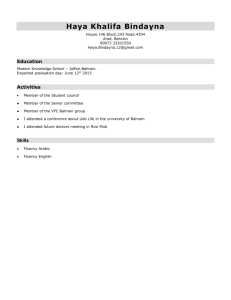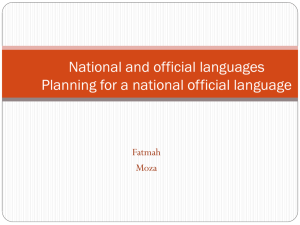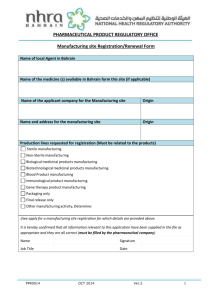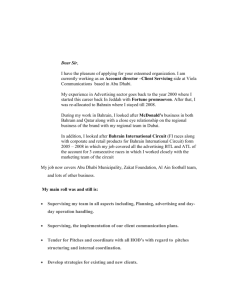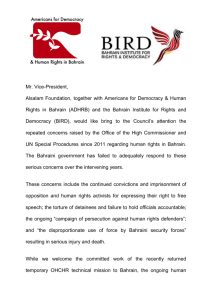WOrking On empLOyment LAW “C LAW FOCUS
advertisement
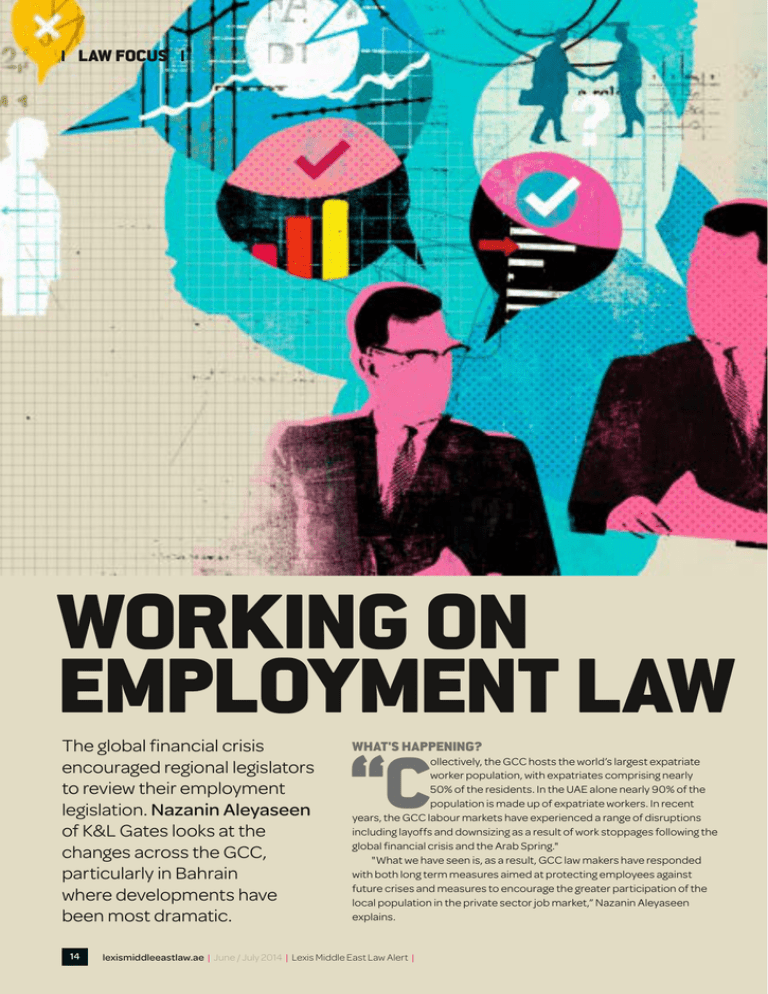
LAW FOCUS Working on Employment LaW The global financial crisis encouraged regional legislators to review their employment legislation. Nazanin Aleyaseen of K&L Gates looks at the changes across the GCC, particularly in Bahrain where developments have been most dramatic. 14 What's happening? “C ollectively, the GCC hosts the world’s largest expatriate worker population, with expatriates comprising nearly 50% of the residents. In the UAE alone nearly 90% of the population is made up of expatriate workers. In recent years, the GCC labour markets have experienced a range of disruptions including layoffs and downsizing as a result of work stoppages following the global financial crisis and the Arab Spring." "What we have seen is, as a result, GCC law makers have responded with both long term measures aimed at protecting employees against future crises and measures to encourage the greater participation of the local population in the private sector job market,” Nazanin Aleyaseen explains. lexismiddleeastlaw.ae | June / July 2014 | Lexis Middle East Law Alert | LAW FOCUS Bahrain’s Response RELATED STORY amending the existing employment law, DIFC Law No. 4/2005. This has provided employees working for DIFC companies with greater clarity on their minimum entitlements including maternity leave entitlement, which is 65 working days, anti-discriminatory provisions and statutory compensation for work place injuries. There are also entitlements to carry over accrued but untaken annual leave." "Meanwhile, on shore, in the UAE, the big change has been the announcement in December 2013 that a compulsory health insurance provision for employees will be issued in Dubai similar to the provision in Abu Dhabi and other free zones operating in Dubai. The Qatari authorities have also announced the implementation of compulsory private health insurance for workers in their country." “One of the most sweeping changes came in Bahrain, Bahrain: Draft Domestic Worker with the introduction of the Law Approved 2012 Labour Law (Bahrain LNB News 03/04/2014 83 Law No. 36/2012 regarding Bahrain’s National Assembly employment in the private has approved a law outlining sector). This replaced Bahrain employment contracts for domestic Law No. 23/1976 which had workers and organising the governed and controlled relationship between employers and employer - employee relations housemaids. in the Kingdom for over 36 years. The aim of this law was to bring Bahrain’s employment relations up to international standards and provide benefits and rights to employees there, which more closely matched those offered to those in the private sector in other In Saudi, Kuwait and Oman GCC states. Benefits available under the “GCC lawmakers have been taking a more old 1976 Law have been increased and active role in encouraging and promoting expanded. These include increasing annual the participation and hiring of their own Nazanin Aleyaseen leave to 30 calendar days, increasing nationals in the private sector. In 2011, Saudi Of Counsel sick leave to 55 days and increasing paid Arabia introduced the Nitaqat system to K&L Gates LLP maternity leave to 60 days. Female workers encourage 'Saudisation' of the private with children under six are also allowed unpaid leave sector. This is essentially a points based system where of up to six months. However, in some respects this employers obtain points from the Labour Ministry new law is actually ahead of equivalent legislation in through various hiring and HR initiatives. The higher other GCC states. For example, unlike Federal Law No. the points, the easier it is for employers to obtain 8/1980 in the UAE, the new Bahrain law also extends 'premium' or 'green' status which allows them to obtain to domestic workers. Another interesting area is the new visas and recruit more staff without needing prior way the law protects employees in Bahrain against approvals from the relevant authorities. Changes have discriminatory practices. There is a prohibition on been made to the Kingdom’s Labour Law, in particular payment of salaries based on sex, ethnic origin, Article 39, to curb foreign workers being employed language, religion or beliefs. In addition, if there are any illegally. As a result, employers cannot now let their delays in the payment of salaries to workers (whether employees go and work for another employer. The the worker is a foreigner or a national) they will be Labour Ministry will carry out inspections and anyone entitled to a 6% penalty," Aleyaseen adds. found to be violating the law will be arrested, deported "The concept of redundancy pay has also been or have other measures taken against them by the introduced and the scope of arbitrary dismissal has Interior Ministry. Kuwait has also launched a crackdown been expanded to include dismissal of an employee to reduce its expatriate population by half by 2023 and because they have taken their lawful vacation a similar programme has been launched in Oman to entitlement or have filed a labour complaint against promote the hiring of nationals there. The Manpower the employer. Most importantly, foreign workers no Ministry announced a freezing of employment of longer require their former employer’s consent to foreign workers between November 2013 and April obtain employment in Bahrain with a new employer." 2014 in certain business sectors with the exception "Severance pay has also been increased to half of foreign workers required for government projects,” a month’s pay for each year in the first three years Aleyaseen explains. of service and a month for each year of subsequent service. An employee will still be entitled to severanceWhat’s next? pay even if they were terminated for a legitimate cause. “Amendments to policy and existing labour laws are Where companies fail to comply with the new Law expected to continue. In the UAE, for example, there is they can be jailed for up to three months and/or fined a proposal to review Federal Law No. 8/1980 and revise between 500 and 1000 Dinars. Jail sentences and it. Similarly, in December 2013, the Saudi government fines will be doubled for repeat offences.” approved further amendments to the Kingdom’s Labour Law, including broadening employee benefits and compensation for arbitrary dismissal. However, UAE Changes the extent to which these policy and law changes will “Like Bahrain, the Dubai International Financial Centre impact the number of foreign workers in the GCC (DIFC) has also amended its employment legislation. remains to be seen,” Aleyaseen concludes. The Free Zone’s Authority issued DIFC Law No. 3/2012 16 lexismiddleeastlaw.ae | June / July 2014 | Lexis Middle East Law Alert |
